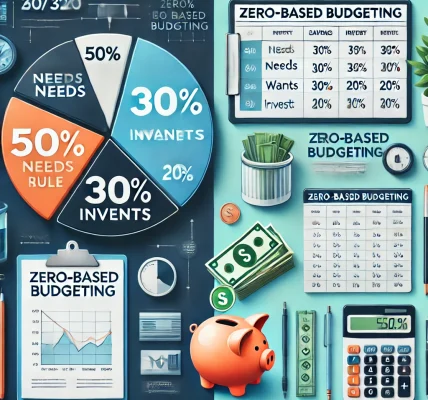Zero-Based Budgeting (ZBB) is a powerful budgeting method that has gained traction in both personal finance and business settings. Unlike traditional budgeting, which adjusts previous budgets, Zero-Based Budgeting requires you to start from scratch each time. This method can help ensure that every penny is allocated purposefully, leading to better financial control and smarter decision-making.
In this blog, we’ll explore the benefits of Zero-Based Budgeting (ZBB) and walk you through the steps to get started with it.
What is Zero-Based Budgeting?
Zero-Based Budgeting is a financial strategy where every dollar of income is assigned a specific purpose, and the budget begins at zero. Unlike traditional budgeting, where you simply adjust last month’s budget based on income and expenses, Zero-Based Budgeting requires you to justify each expense from the ground up. Whether you’re looking at your personal budget or evaluating business expenditures, ZBB forces you to reassess your priorities and allocate resources efficiently.
The Key Benefits of Zero-Based Budgeting
1. Improved Financial Awareness
By starting from zero and reviewing all your expenses, Zero-Based Budgeting forces you to evaluate each category carefully. You’ll gain a clearer understanding of where your money is going and where you can cut unnecessary costs. This increased awareness can help you make more informed financial decisions.
2. Optimized Resource Allocation
Zero-Based Budgeting enables you to allocate funds based on your current needs, rather than just carrying over the previous budget. This ensures that every dollar spent is justified and aligned with your top priorities, avoiding unnecessary or outdated expenses.
3. Increased Savings and Investment Potential
Because Zero-Based Budgeting pushes you to reconsider all your expenditures, it’s easier to spot areas where you can cut back. These savings can be redirected into more productive ventures, such as saving for future goals or investing in opportunities that will grow your wealth.
4. Debt Reduction and Financial Freedom
Zero-Based Budgeting can help you focus on debt reduction. By giving you a clear picture of your cash flow, you can make adjustments to prioritize paying down high-interest debts, leading you closer to financial independence.
5. Greater Control Over Spending
ZBB eliminates the habit of “spending what’s left” at the end of the month. Since every dollar has a specific purpose, you gain better control over your finances and reduce the temptation to overspend.
How to Start Zero-Based Budgeting
Now that you understand the benefits, let’s dive into how you can implement Zero-Based Budgeting in your life or business.
Step 1: Evaluate Your Income
The first step in Zero-Based Budgeting is determining your total income for the budgeting period (monthly, quarterly, etc.). This includes all sources of income such as salary, bonuses, investments, or side hustles.
Step 2: Identify Your Expenses
List all of your expenses. These can be categorized into fixed expenses (rent, mortgage, utilities) and variable expenses (food, entertainment, discretionary purchases). Be as detailed as possible. It’s crucial that every expense, no matter how small, is accounted for.
Step 3: Prioritize Expenses
Once all expenses are listed, categorize them by priority. Essential expenses like housing and food should take precedence, while non-essential categories like dining out or entertainment can be trimmed or eliminated. The goal is to assign every dollar an explicit purpose, with a focus on the most important needs first.
Step 4: Allocate Funds
With Zero-Based Budgeting, every dollar must be assigned to a category. This includes savings and debt repayment. After your essential needs are covered, allocate funds for discretionary spending, savings, and investments.
Step 5: Monitor and Adjust
A key element of Zero-Based Budgeting is continuous monitoring and adjustment. Track your spending regularly to ensure you’re staying within your budget. If any category needs more funds, adjust accordingly, ensuring that the overall total still equals zero.
Zero-Based Budgeting Tips for Success
- Track Your Expenses: Consistently track your expenses using a budgeting tool or app. This will ensure you stay on top of your allocations and can make quick adjustments as necessary.
- Review Regularly: ZBB isn’t a one-time effort. It requires regular review, especially if your income or expenses fluctuate.
- Stay Disciplined: The discipline to cut back on non-essentials and redirect those funds toward saving or investing is critical to making ZBB work.
- Be Realistic: Start by creating a practical budget. Don’t overestimate your savings potential. Set achievable goals that align with your financial priorities.
Final Thoughts
Zero-Based Budgeting is a transformative method that can help you take control of your finances, whether you’re looking to eliminate debt, save more, or optimize your spending. By reassessing every dollar and assigning it a purpose, you’ll develop a more intentional approach to managing money, which can lead to long-term financial success.
If you’re ready to take the next step toward financial freedom, Zero-Based Budgeting is the tool you need. Start today, and see how it can revolutionize your financial life!




